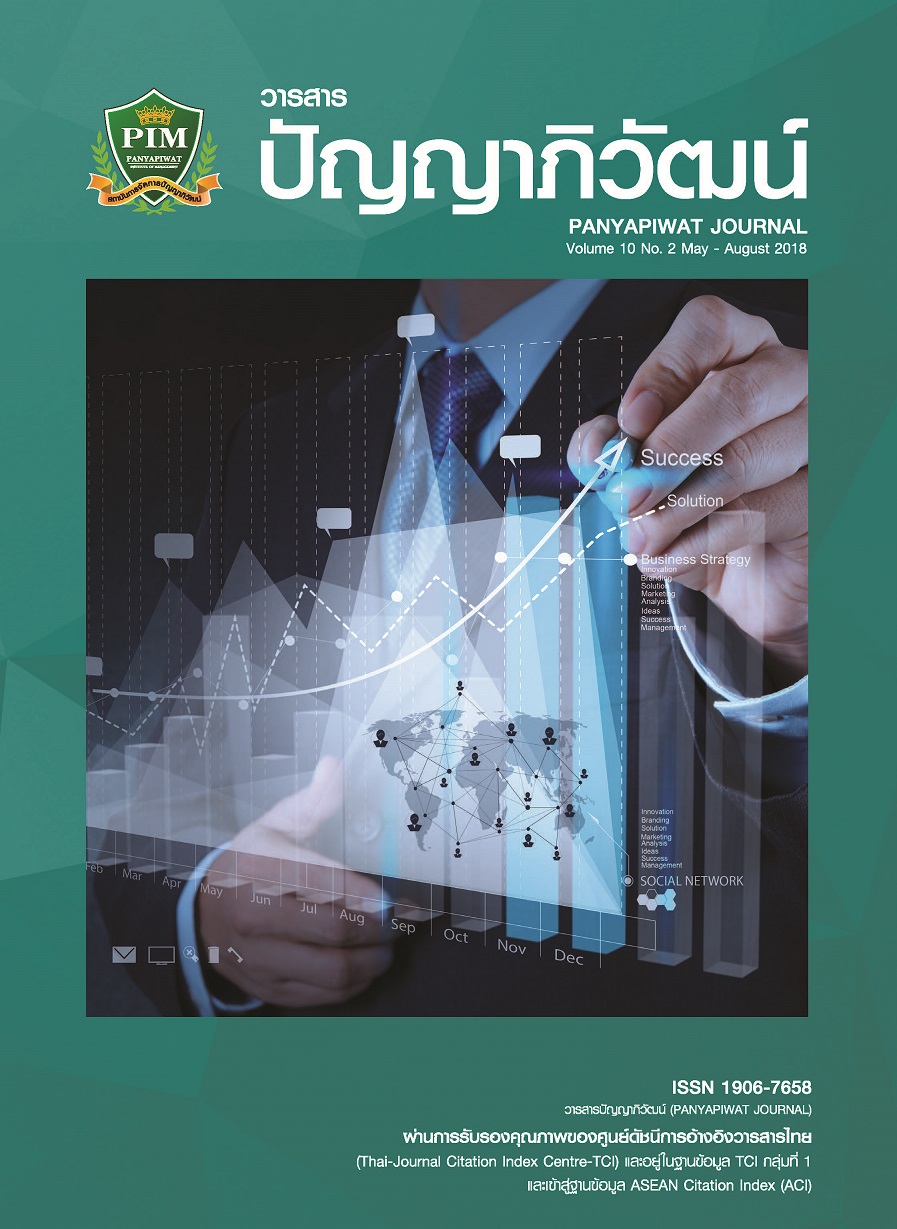การศึกษากลุ่มเสี่ยงและปัจจัยปกป้องพฤติกรรมการเล่นเกมออนไลน์อย่างเหมาะสม ของนักเรียนชั้นมัธยมศึกษาตอนต้น
Main Article Content
บทคัดย่อ
การวิจัยนี้มีวัตถุประสงค์เพื่อศึกษากลุ่มเสี่ยงและปัจจัยปกป้องพฤติกรรมการเล่นเกมออนไลน์อย่างเหมาะสมของนักเรียนชั้นมัธยมศึกษาตอนต้น กลุ่มตัวอย่างที่ใช้ในการวิจัยครั้งนี้เป็นนักเรียนที่กำลังศึกษาชั้นมัธยมศึกษาตอนต้น โรงเรียนในเขตกรุงเทพมหานครและปริมณฑล โดยใช้การสุ่มตัวอย่างแบบหลายขั้นตอน (Multistage random sampling) รวม 400 คน เครื่องมือที่ใช้ในการเก็บรวบรวมข้อมูลโดยใช้แบบวัดตัวแปรเชิงสาเหตุและผลของพฤติกรรมการเล่นเกมออนไลน์อย่างเหมาะสม วิเคราะห์ข้อมูลด้วยวิธีการวิเคราะห์ t-test ความแปรปรวนแบบทางเดียว (One-way analysis of variance) และการวิเคราะห์ถดถอยพหุคูณแบบเป็นขั้น (Stepwise Multiple Regression) ผลการวิจัยสรุปได้ดังนี้
ตัวทำนายพฤติกรรมการเล่นเกมออนไลน์อย่างเหมาะสมที่สำคัญเรียงจากมากไปน้อยคือ การรู้เท่าทันเกมออนไลน์ อิทธิพลของเพื่อนในการเล่นเกมออนไลน์ และการควบคุมการเล่นเกมออนไลน์ในครอบครัว ค่าการพยากรณ์ของพฤติกรรมการเล่นเกมออนไลน์อย่างเหมาะสมของนักเรียนชั้นมัธยมศึกษาตอนต้นพบว่า มีค่าเท่ากับ 0.21 กล่าวคือ ตัวแปรปัจจัยทางจิตสังคม สามารถร่วมกันอธิบายความแปรปรวนของพฤติกรรมการเล่นเกมออนไลน์อย่างเหมาะสมของนักเรียนชั้นมัธยมศึกษาตอนต้นได้ร้อยละ 21 อย่างมีนัยสำคัญทางสถิติที่ระดับ .05 โดยนักเรียนที่เป็นกลุ่มเสี่ยงเร่งด่วนที่ควรพัฒนาคือ นักเรียนที่มีพฤติกรรมการเล่นเกมออนไลน์อย่างเหมาะสมน้อย ได้แก่ กลุ่มนักเรียนที่พำนักพักอาศัยอยู่คนเดียวและกลุ่มนักเรียนที่มีเกรดเฉลี่ย 2.50-2.99 โดยมีปัจจัยปกป้องที่สำคัญ ได้แก่ การรู้เท่าทันเกมออนไลน์ การควบคุมการเล่นเกมออนไลน์ในครอบครัว และเจตคติต่อพฤติกรรมการเล่นเกมออนไลน์อย่างเหมาะสม
Article Details
“ข้าพเจ้าและผู้เขียนร่วม (ถ้ามี) ขอรับรองว่า บทความที่เสนอมานี้ยังไม่เคยได้รับการตีพิมพ์และไม่ได้อยู่ระหว่างกระบวนการพิจารณาลงตีพิมพ์ในวารสารหรือแหล่งเผยแพร่อื่นใด ข้าพเจ้าและผู้เขียนร่วมยอมรับหลักเกณฑ์การพิจารณาต้นฉบับ ทั้งยินยอมให้กองบรรณาธิการมีสิทธิ์พิจารณาและตรวจแก้ต้นฉบับได้ตามที่เห็นสมควร พร้อมนี้ขอมอบลิขสิทธิ์บทความที่ได้รับการตีพิมพ์ให้แก่สถาบันการจัดการปัญญาภิวัฒน์หากมีการฟ้องร้องเรื่องการละเมิดลิขสิทธิ์เกี่ยวกับภาพ กราฟ ข้อความส่วนใดส่วนหนึ่งและ/หรือข้อคิดเห็นที่ปรากฏในบทความข้าพเจ้าและผู้เขียนร่วมยินยอมรับผิดชอบแต่เพียงฝ่ายเดียว”
เอกสารอ้างอิง
Bandura, A. (1986). Social foundations of thought and action: A social cognitive theory. New Jersey: Prentice-Hall.
Bhanthumnavin, D. (1995). Tree theory, ethics and individual development. Bangkok: Promotion Academic Documents National Institute of Development Administration. [in Thai]
Bhanthumnavin, D. (2000).Ethical tree theory: research and development (2nd ed.). Chulalongkorn University Printing House. [in Thai]
Bhanthumnavin, D. (2009). Principles and methods of document processing for excellence in behavioral research (2nd ed.). Bangkok: AA Public Company. [in Thai]
Biggins, O. (2009). Building Up the Virtual Community in Online Games and “Onlineaholics” Behaviour of Adolescents in Bangkok Metropolitan. Journal of the Internet, 23(70), 7-21. [in Thai]
Intune, S. (2009). Psychosocial factors and effects on stress management of reading behavior in adolescent students. M.Sc. (Applied Research Applied Psychology), Behavioral Science Research Institute, Srinakharinwirot University. [in Thai]
Magnusson, D. & Endler, N. S. (1977). Personality at the Crossroad: Current Issues in Interactionism Psychology. New Jersey: LEA Publisher.
Ministry of Public Health Department of Mental Health, Institute of Mental Health, Children and Teens. (2013). Chart showing percentage of children Game in Thailand. Retrieved November 25, 2017, from https://www.icamtalk.com [in Thai]
Pornnapadol, C. & Khamklieng, K. (2014). The Development of Game Addiction Screening Test (GAST). J Psychiatr Assoc Thailand, 59(1), 3-14. [in Thai]
Ramasut, P. (2009). Immunization of online games for Thai youth. Bangkok: National Research Council of Thailand. [in Thai]
Saiyot, L. & Saiyot, A. (1985). Principles of educational research. Bangkok: Suksaporn. [in Thai]
Sareerasart, W. (2011). The relationship among social situation and psychological immunity to internet Behavior focusing on safety and usefulness of female students in high schools with and without internet safety project.Master of Science Degree in Applied Behavioral Science Research, Behavioral Science Research Institute, Srinakharinwirot University. [in Thai]
Thabthan S. (2014). Media and Information Literacy. Journal of Industrial Education, 13(2), 1-5. [in Thai]
Thammacharoen, S. & Suwandee, L. (2004). Psychosocial indicators of adolescent behavior in areas with different provocative sources. Research Report. Bangkok: Research and Development of Thai Behavioral Systems, National Research Council of Thailand. [in Thai]
The mental health department. (2017). Warns the game “MOBA” to make the brain addicted to the game, teenagers addicted to the game 1.5 times in 3 years. Retrieved July 11, 2017, from https://www.dmh.go.th/news-dmh/view.asp?id=26433 [in Thai]


